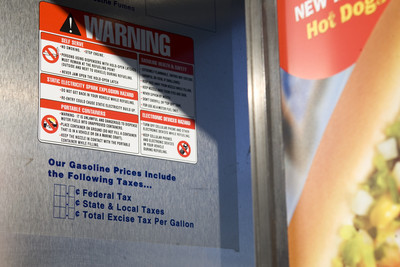Can you tell roads need fixing?

There was big news this week out of Washington, D.C., and I bet it has the politicians running scared.
A nonpartisan commission spent the last two years examining our nation’s transportation system, and its prognosis was negative.
The National Surface Transportation Policy and Revenue Study Commission announced that the transportation network is in crisis. That’s just in case the August bridge collapse in Minneapolis that left 11 dead and more than 100 injured didn’t supply enough of a hint.
The bombshell dropped Tuesday was the commission’s recommendation that the federal gasoline tax increase by as much as 40 cents per gallon over the next five years so we can fix our very expensive problems.
Depending on the size of the gas tank in your vehicle, that means an extra $6 to $12 tacked on to every fill-up.
And if you haven’t noticed, gas prices haven’t exactly been cheap of late.
Now, it should be clear that there is not a snowball’s chance in Hades (as one Florida congressman put it) that a tax increase of that magnitude would be enacted anytime soon, especially with the November elections swiftly approaching.
The federal gas tax now is 18.4 cents per gallon. It hasn’t been raised since early in the Reagan administration.
I had a chance this week to speak with Nevada transportation consultant Tom Skancke, who was appointed to the commission by Senate Majority Leader Harry Reid, D-Nev.
Our national transportation infrastructure is inadequate and obsolete, Skancke said. Our bridges have deteriorated, and our freight rails and roads are at capacity.
“Our system is 50 to 60 years old with a shelf life of 30 years, and we are patching it together,” Skancke said.
The commission took a serious look at the needs of the nation and determined, “the only way to fix it is to reinvest in America. And we have not done that in 25 to 30 years,” he said.
The commission’s recommendations would cost $225 billion a year for the next 50 years. And that’s the low estimate.
Yes, there are other revenue options, including erecting tolls on highways, increasing freight fees and ticket taxes for passenger rail improvements, but Skancke and eight of the other 12 commissioners believe that all of it is needed.
“We need every funding mechanism we can” think of, Skancke said.
The commission did not just look at spending money. It also looked at saving money.
There is a lot of wasted time, which in turn wastes money, that needs to be curtailed, Skancke said.
“If you add one federal dollar to a project, it adds eight to 10 years to the project,” because of all the environmental studies that need to be done, he said.
For instance, if you want to build a bridge over water and need federal money to do it, you need two environmental impact plans, and have to gain approval from the following federal agencies: the Environmental Protection Agency, the Department of Transportation, the Department of Fish and Wildlife, the Department of the Interior, and the Army Corps of Engineers, among others.
The departments are not required to coordinate with each other.
For an example locally, look no further than the U.S. Highway 95 widening project. It took a decade to plan and build.
The kicker is that shaving five years off the planning stage of a project can save 40 percent of the cost, due to inflation, Skancke said.
The census predictions are that the population of the United States will balloon by another 150 million people over the next 50 years. All of those people are going to have to get from home to work just like you and me.
But what really frightens Skancke is that the crisis is already here and it’s debatable whether our elected officials have the backbone to do anything about it.
“There has been a lack of investment and vision on the part of the federal government” when it comes to transportation, he said.
As proof, Skancke offered that the commission he was a part of was the first of its kind since the 1950s.
“This vision is going to take courage,” he said. “The crisis is here. If we don’t do something now it’s not going to get fixed.”
After reading the report, and talking with Tom, maybe the politicians shouldn’t be the only ones running scared.
If you have a question, tip or tirade, call the Road Warrior at 387-2904, or e-mail him at roadwarrior@reviewjournal.com or fmccabe@reviewjournal.com. Please include your phone number.